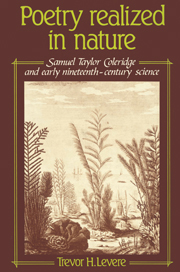Book contents
- Frontmatter
- Contents
- Preface
- Introduction: nature and mind
- CHAPTER 1 Early Years: From Hartley to Davy
- CHAPTER 2 Surgeons, Chemists, and Animal Chemists: Coleridge's Productive Middle Years From the Biographia Literaria to Aids to Reflection
- CHAPTER 3 Two Visions of the World: Coleridge, Natural Philosophy, and the Philosophy of Nature
- CHAPTER 4 Coleridge and Metascience: Approaches to Nature and Schemes of the Sciences
- CHAPTER 5 The Construction of the World: Genesis, Cosmology, and General Physics
- CHAPTER 6 Geology and Chemistry: The Inward Powers of Matter
- CHAPTER 7 Life: Crown and Culmination
- Notes
- Index
CHAPTER 4 - Coleridge and Metascience: Approaches to Nature and Schemes of the Sciences
Published online by Cambridge University Press: 09 October 2009
- Frontmatter
- Contents
- Preface
- Introduction: nature and mind
- CHAPTER 1 Early Years: From Hartley to Davy
- CHAPTER 2 Surgeons, Chemists, and Animal Chemists: Coleridge's Productive Middle Years From the Biographia Literaria to Aids to Reflection
- CHAPTER 3 Two Visions of the World: Coleridge, Natural Philosophy, and the Philosophy of Nature
- CHAPTER 4 Coleridge and Metascience: Approaches to Nature and Schemes of the Sciences
- CHAPTER 5 The Construction of the World: Genesis, Cosmology, and General Physics
- CHAPTER 6 Geology and Chemistry: The Inward Powers of Matter
- CHAPTER 7 Life: Crown and Culmination
- Notes
- Index
Summary
Unity in multeity: the need for a method
In 1803, Coleridge jotted down a note for a “Poem on Spirit – or on Spinoza – I would make a pilgrimage to the Deserts of Arabia to find the man who could make understand how the one can be many! Eternal universal mystery! It seems as if it were impossible; yet it is – & it is every where!” Multeity was everywhere. The empiricist tradition in science emphasized it – indeed, for Coleridge, presented nature as made up exclusively of a world of little things. This was intellectually and emotionally unsatisfying. “I can contemplate nothing but parts, & parts are all little –! – My mind feels as if it ached to behold & know something great – something one & indivisible – and it is only in the faith of this that rocks or waterfalls, mountains or caverns give me the sense of sublimity or majesty! – But in this faith all things counterfeit infinity!”
The observer, faced by the vast richness of the world of the manifold, sought and needed to appreciate its minute beauties while grasping its unity. At one level, this synthetic function was carried out by the understanding, which brought together a multitude of impressions into a unity by identifying something common to them all. But this was limited by the extent of the observer's experience. The understanding was not enough, and a different approach was needed.
- Type
- Chapter
- Information
- Poetry Realized in NatureSamuel Taylor Coleridge and Early Nineteenth-Century Science, pp. 82 - 121Publisher: Cambridge University PressPrint publication year: 1981



